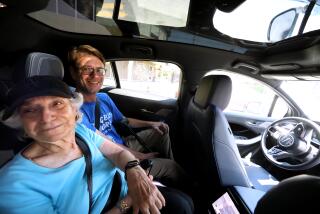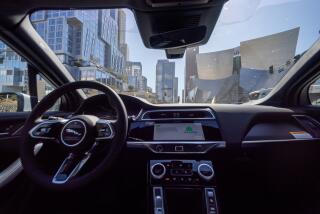The American public is still very afraid of self-driving cars, survey finds
- Share via
Seven in 10 Americans don’t want to go anywhere near self-driving cars.
The portion of Americans who fear autonomous vehicles — 71% in the American Automobile Assn.’s latest survey — is virtually unchanged from a year ago and up eight percentage points from 2017. Although public skepticism isn’t new, its consistency is noteworthy.
Last year’s survey, in which 73% expressed anxiety about self-driving cars, came out just nine weeks after an autonomous test vehicle operated by Uber Technologies Inc. killed a pedestrian in Tempe, Ariz.
There has been virtually no increase in public acceptance even as automakers and tech giants are pouring billions of dollars into driverless technology. Honda Motor Co. and Japan’s SoftBank Vision Fund invested a combined $5 billion in General Motor Co.’s Cruise autonomous-driving unit last year, and Volkswagen AG is in talks about investing in Ford Motor Co.’s Argo AI, with the two said to be discussing a $4-billion valuation. AAA’s studies suggest public opinion could be a steep challenge when it comes time to persuade customers to pay for the transportation of the future.
“It’s possible that the sustained level of fear is rooted in a heightened focus, whether good or bad, on incidents involving these types of vehicles,” Greg Brannon, AAA’s director of automotive engineering, said in a statement. “Also it could simply be due to a fear of the unknown.”
Unlike in years past, the latest AAA survey lands at a moment when self-driving businesses are starting to engage with the public. Waymo, the self-driving start-up launched inside Google, began offering a robotaxi service in suburban Phoenix in December.
GM plans its own driverless ride-hailing service in a U.S. city this year. Meanwhile, driverless test cars are logging millions of miles on public roads in states including California, Arizona, Florida, Pennsylvania and Michigan.
The creators of self-driving technology have acknowledged their trust problem. In January, Waymo joined with Cruise Automation and 22 other organizations to form a coalition aimed at easing consumer concerns about autonomy. The Partnership for Automated Vehicle Education, or PAVE, has said it will conduct self-driving test rides for consumers and policymakers, as well as conduct educational workshops and develop informational materials for lawmakers, consumers and educators.
Deadly crashes are far from the norm. In fact, the cautious characteristics of autonomous driving have resulted in a series of minor collisions, often involving impatient humans unaccustomed to the rigid rule-following of robots.
Familiarity appears to be key to easing anxiety. The AAA survey of 1,008 Americans found that drivers of cars with lane-keeping software, automatic emergency braking and other forms of automated driver assistance are far more comfortable with these features. Use of driver-assist technology make drivers 68% more likely to trust semi-autonomous cars, the study found.
The survey also gauged public reaction to more limited uses of autonomous vehicles. Just more than half of U.S. drivers — 53% — said they would be comfortable using fully self-driving vehicles as low-speed people-mover systems at airports or theme parks, free from the chaotic traffic of the open road.
Even fewer Americans — 44% — said they would be comfortable with autonomous delivery vehicles that haul food or packages, but not passengers.
These limited deployments might also help ease the public into acceptance. “Americans are willing to take baby steps toward incorporating this type of technology into their lives,” Brannon said. “Hands-on exposure in more controlled, low-risk environments coupled with stronger education will play a key role in easing fears.”
Putting children or family members into a fully self-driving car? Only 19% of those surveyed would be comfortable with that.
But all the general wariness still isn’t translating into doubt that the self-driving future may be inevitable. More than half of those surveyed — 55% — believe that by 2029, most cars will have the ability to drive themselves.






